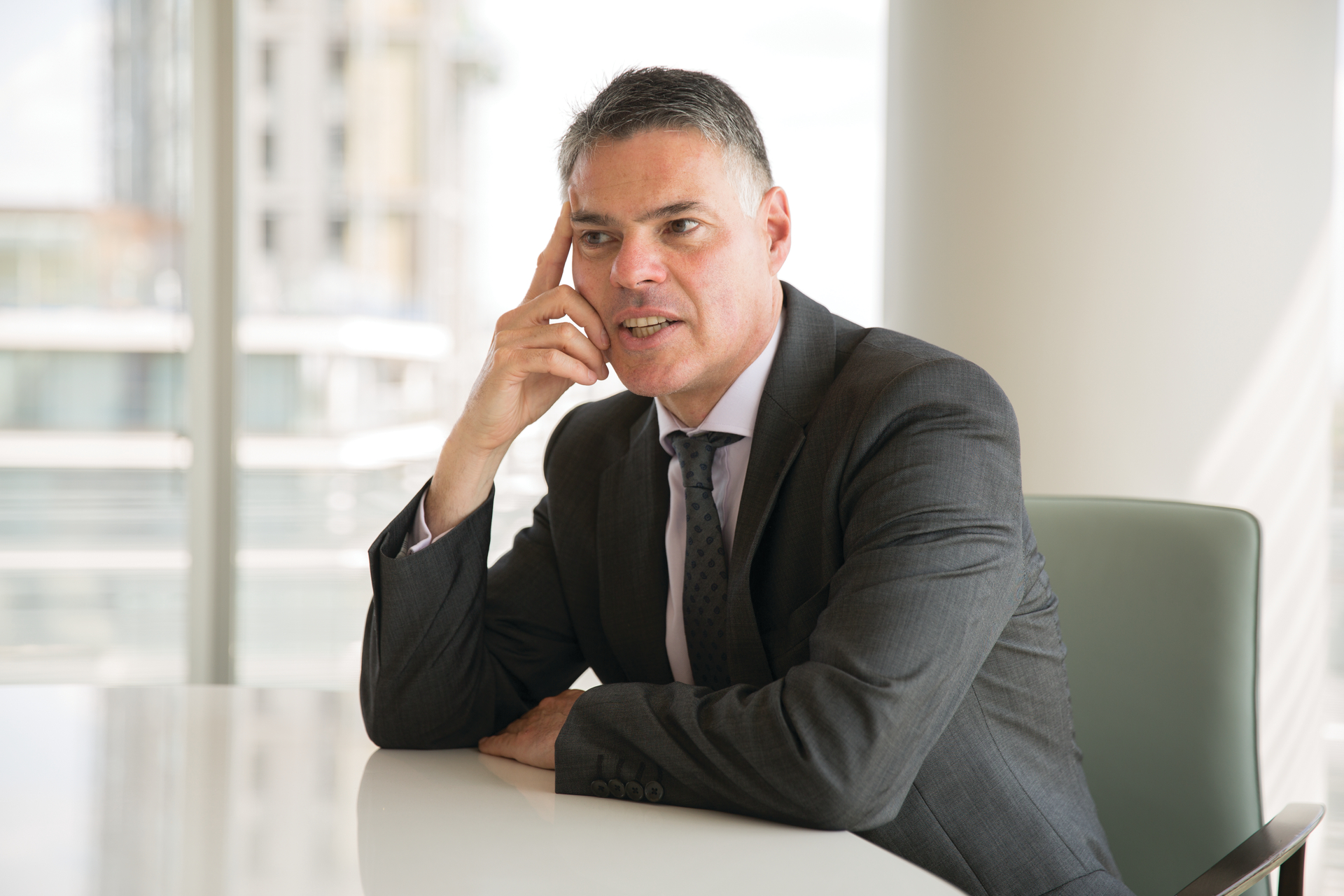
In search of joy
Say it in a postcard | Issue 20 | 2022


Martin Scott in conversation with Ingeborg Alexander in 2015
I started learning Mandarin some years back; I thought it would help with work. I started to learn to write characters. Being able to read even a few characters helps to reinforce the learning. When I’m in Beijing and I’m on the underground, at least I can read the odd sign. The accent in Beijing is difficult to follow—and everyone speaks so fast. And of course Mandarin has different tones from Cantonese. I find it really hard.
I hardly ever talk about work at home. I keep the boundary because I think you need space. Obviously it blurs, but I don’t think it has to blur any more than it needs to blur.
I was born in Hong Kong in 1959 and lived there until I went to university. I originally wanted to do a geography degree but my dad wouldn't pay for it. He said I had to do something vocational.
Hong Kong was home.
In the late 1940s lots of wealthy entrepreneurial Chinese people moved from Shanghai to Hong Kong and that transformed Hong Kong. They moved their factories, they moved their machinery, everything.
In the early 1960s there was a big movement of people across the border after the failure of the Great Leap Forward. The lady who looked after me when I was a baby came across in the early sixties. I remained close to her until she died a few years ago.
I would go and visit her house and I would go shopping with her to the market, so I got to experience a side of Hong Kong that maybe some expats didn’t see.
Hong Kong was poor back then. Living in a place where you’ve got four people living effectively in one room with no toilet, that’s real poverty.
There were riots in '66 and '67. We had curfew and bombs. During the day you had to be careful about some of the places you went to if you were a European because you weren't really wanted. I remember our school bus being stoned on the way to school. Border guards got shot. It wasn't a great time.
Hong Kong didn't take off until the early 1970s. Before that it was a real backwater. It was always quite vibrant because it was this entrepôt on the edge of China—China being pretty much closed—but there were no skyscrapers. The first proper skyscraper, Jardine House, was built in 1972 on reclaimed land. And it was very rural. Sha Tin back then was a fishing village of a few thousand; now it’s a town of more than 600,000.
The islands were completely rural. When you got off the ferry at Lantau you had to run to get on the bus because there was only one bus an hour and it only took half the number of people on the ferry.
It was a very different place from now. It was poor; there were beggars everywhere.
Obviously I was privileged just because I was European, but we weren’t privileged in a very rich way, we were just privileged in that my father had a job and earned a reasonable income.
It was still a very colonial place. We didn’t learn Chinese at school, we learned French. At primary school my parents had paid for me to learn Cantonese. The classes didn’t last very long, unfortunately, so my Cantonese is still pretty bad. But I could at least speak it back then, even if it was just street talk.
I didn’t go to boarding school. It was expensive. And the education system in Hong Kong was fine.
School’s not something I hanker back to. It’s something I’d quite like to forget. I wasn’t one of the cool kids. I didn’t have long hair. My dad wouldn’t let me have long hair. You can imagine what it was like growing up in the seventies without long hair.
My parents had been through the war and it was just traumatic for them and I think that whole generation—particularly for my mother, who was in Singapore. She lost her first husband in the early years of the Pacific war. Lots of their friends were killed or ended up in POW camps.
In those days the kids had to rub along with what the adults wanted to do and that’s just the way it was.
My children are 22 and 20. My son’s at UCLA doing a Master’s in law and my daughter’s doing a degree in human, social and political science.
Coming to the UK in the 1970s was a complete culture shock. The food was really bad. You couldn't buy Chinese vegetables in the supermarket. You couldn’t go to the greengrocer and buy a red pepper—you had to order one. I didn't know what anything was called. I spoke the language and no one would have thought anything other than that I was English, but actually I was a foreigner.
I was very keen to go back to Hong Kong when I was an associate, because for me it was going home.
I went back again to Hong Kong when I became a partner. It meant my wife had to put her career on hold. In those days to become an educational psychologist you had to have taught for five years before you could do your Master’s, and her five years were basically up at the time we went to Hong Kong. We struck up an agreement that we would save the money to pay for her to go back to university after Hong Kong and I would support her while she did her course.
My dad was British and my mum was a bit of a mongrel like me. She was half Portuguese, half Armenian.
When my parents left Hong Kong they went to the Gold Coast, so we used to go to Australia a lot to visit. My father died quite soon after they retired. My mother was quite stoical and just got on with life and carried on in Australia for another twenty years on her own.
I don’t understand why people decide to live somewhere different when they retire. I can’t see myself doing that.
I met my wife at school. She came out to Hong Kong when she was twelve. We started going out when we were sixteen.
We didn’t get married until we were in our mid-twenties. Because we always knew that we would change. So the question was, would we change in the same way.
We went to different universities in the UK. It was quite tough keeping a relationship going in pre mobile phone days, where I had to be in a phone box and she had to be in a phone box at the same time and hope someone else wasn’t in the box at the time, and there always was someone.
My wife's an educational psychologist. Neither of us likes forms of segregation. We moved out of London deliberately to go somewhere with good state schools so we've essentially made a very middle class choice. The kids went to a state boarding school. They didn't board but there were boarders there, so they had quite an international background to their education.
My wife is doing a PhD right now, something to do with aspects of learning by children where English is their second language.
I think being insular can be dangerous. I think you live in a society and you should understand what happens in all parts of that society.
My children would definitely say that I take a serious view of life. I’m not so fun as I could be. It’s not in my psyche. That doesn’t mean I don’t enjoy fun times.
I like to compartmentalize things, because then you don’t feel guilty.
My kids would say I wasn’t home enough, there’s no doubt about that. My work has always been what I do on Mondays to Fridays—even when the kids were young I would work very late during the week—but at the weekends I would go home on a Friday night knowing that, on the whole, unless something really had to be done, the weekend was free. And then that would be devoted completely to the children. That was my way of balancing things.
What I didn’t have for a long part of my life was any ‘me time’. It was split between doing what was right for work and then doing what was right for the kids. I do do things for me now. I swim—that’s one thing. I will open water swim in Canada or in the States or in Australia, where the water is clean, but I haven’t done it in the UK.
My wife and I have started coming to London at the weekend. We are both city people and London is one of the world’s best cities. It’s a real privilege to live in London in my view because there’s so much to do. It’s absolutely brilliant.
London would be a great place to retire. I think people get it the wrong way round. You work in London and there’s so much happening around you that you never have time to do, but when you’re retired it’s all there: how could you get bored in London?
I like popular music. I took my son to his first concert to see Joe Jackson at the Cadogan Hall. It was brilliant. I like going to intimate venues. I went to see Joss Stone at the Hammersmoth Apollo. People talked throughout the concert and spent their time videoing it on their mobile phones. The best concert I ever went to was the Eurythmics at the Hammersmith Odeon. At the end, Annie Lennox sang a song called ‘Jennifer’ without any musical accompaniment, and it was just staggering.
If I’m travelling for work and I have a weekend somewhere, I will wander. I was in Singapore recently and I spent eight hours one day just walking, with no plan as to where I was going. I usually take my camera. When my wife and I went to Shanghai in the mid 1980s we had this book called In Search of Old Shanghai. We used it to find out what all the buildings, the old houses and shops, had once been; it was really interesting. There was a French patisserie which had carried on all the way through since the 1940s.
I like Australian indigenous art. Most of it tends to be quite big and you have to be very careful what you buy, because it can be quite hard to fit it into a home in the UK, where the walls tend to be smaller and the light is duller. Our home is a mixture of Chinese, Japanese and Aboriginal art and the odd European piece. It may sound a strange mixture but we think it works.
I am easily contented. But I’m also easily discontented. My wife will say I always look for the worst in things. I definitely seek perfection. I—unfortunately—expect the same standards from others that I would apply to myself.
My temper used to be pretty bad. I think it’s more controlled now. Deliberately controlled. I’ve worked at that quite hard. I think to be honest it came out of stress. Maybe as you get older, you get more mellow? That’s one of the nicest things about getting older. Mellow is nice, better for you.
© Norton Rose Fulbright LLP 2025